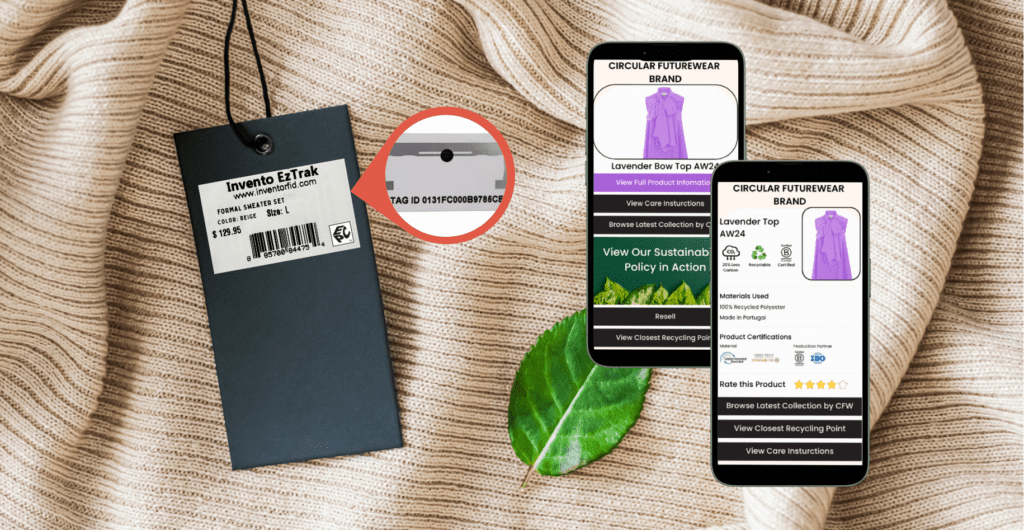Digital Product Passport (DPP) Powered with RFID
The Digital Product Passport (DPP) is a digital record or “digital twin” of a product containing key information about its composition, origin, and lifecycle.

The DPP is a solution to promote transparency, circularity, and sustainable production and consumption. The goal of the DPP with RFID solutions is to make relevant product information available to all stakeholders, including consumers, so they can better understand the products they use and their impact. Key Information Contained in the DPP:
- Product Traceability and Identification: Unique product code, materials, origin, specifications, place of manufacture, batch, and date.
- Ownership and Usage History: Manufacturer warranty.
- Environmental Impact: Carbon footprint, recyclability, and disposal suggestions.
- Authentication and Anti-Counterfeiting Measures.
How Does the DPP Work and How is Authentication Validated?
The DPP integrates authentication and RFID technologies to provide a secure and transparent digital identity for products. RFID tags are placed on materials, semi-finished and finished products, and/or reusable transport containers during manufacturing to automatically capture information about the product and/or process.
Data collected automatically from these RFID tags at various stages are sent to a central cloud system, capturing the entire journey and critical information of the product, creating a “digital twin.” Each product is assigned a unique EPC (Electronic Product Code) through an RFID tag that also includes a unique serial number. Both identifiers are linked to a cloud server to verify the product’s existence and authenticity.
When the tag is scanned, the user accesses an encrypted server to validate authenticity and view detailed product information, including origin, materials, environmental impact, care instructions, and recycling guidelines.
Regulatory Compliance in the UE and USA
The EU Green Deal aims to make the economies of member countries and their suppliers more sustainable and reduce greenhouse gas emissions by 55% by 2030 compared to 1990 levels. The Circular Economy Action Plan (CEAP), part of this initiative, focuses on reducing consumption and increasing the use of circular materials in key sectors such as electronics, textiles, and furniture. It also aims to educate and empower consumers, making sustainable products the standard in the EU. Key Dates for Digital Product Passport (DPP) Compliance:
- July 2024: The Ecodesign for Sustainable Products Regulation (ESPR) was approved in the EU.
- December 2025: The CEN/CLC/JTC24 will deliver standard norms for the Digital Product Passport (DPP) system.
- January 2026: Publication of the act for textiles with specific requirements by product category.
- July 2027: Deadline for compliance with the standard and implementation of the DPP.

The U.S. is also considering regulatory changes under the U.S. Trade and Investment Law (The Americas Act) to reduce dependence on Chinese manufacturing and boost domestic and regional textile production. The law focuses on circular fashion with over $14 billion in incentives for textile recycling, resale, and waste sorting. As the first federal bill targeting textile circularity, it enjoys bipartisan support but faces a challenging legislative process. Key provisions include a 15% tax reduction for companies involved in textile reuse and recycling, reshoring and nearshoring incentives, and closing tax loopholes that currently allow e-commerce giants like Shein and Temu to avoid U.S. import duties.
Additionally, California’s groundbreaking SB707 law, which was passed recently, marks a significant step forward in extended producer responsibility (EPR) and textile circularity. This landmark legislation requires brands and manufacturers to take accountability for the lifecycle of their products, promoting sustainable practices like textile recycling, repair, and resale. With ambitious goals to reduce waste and foster a circular economy, SB707 establishes a framework to minimize environmental impact while encouraging innovation in the fashion and textile industries. As the first state-level law of its kind in the U.S., it sets a precedent for future regulations nationwide and underscores the growing importance of sustainability in retail and manufacturing.
Make Traceability Effortless with Blockchain x RFID
Invento has partnered with Infinfty, a powerful digital product passport platform solution that leverages Blockchain and RFID technologies to simplify how suppliers manage and share sustainability and traceability data across the supply chain. Built for industries like fashion and consumer goods, it removes the complexity of documentation and audit requests by offering a centralized hub for tracking product movement, storing compliance certifications, and managing sustainability records.

Key Benefits for Suppliers:
-
Centralized Document Management: Upload and share certifications, disclosures, and legal docs with all your clients from one secure platform.
-
Supply Chain Traceability: Prove product chain of custody and environmental impact at every stage—from raw material to finished goods.
-
Audit Readiness: Streamline third-party and ongoing audits with automated workflows and real-time notifications.
-
RFID Integration: Enable real-time tracking of products via RFID for end-to-end visibility and automation.
-
Digital Product Twins (DPP): Assign digital twins to each item for granular tracking and seamless integration with circularity initiatives.